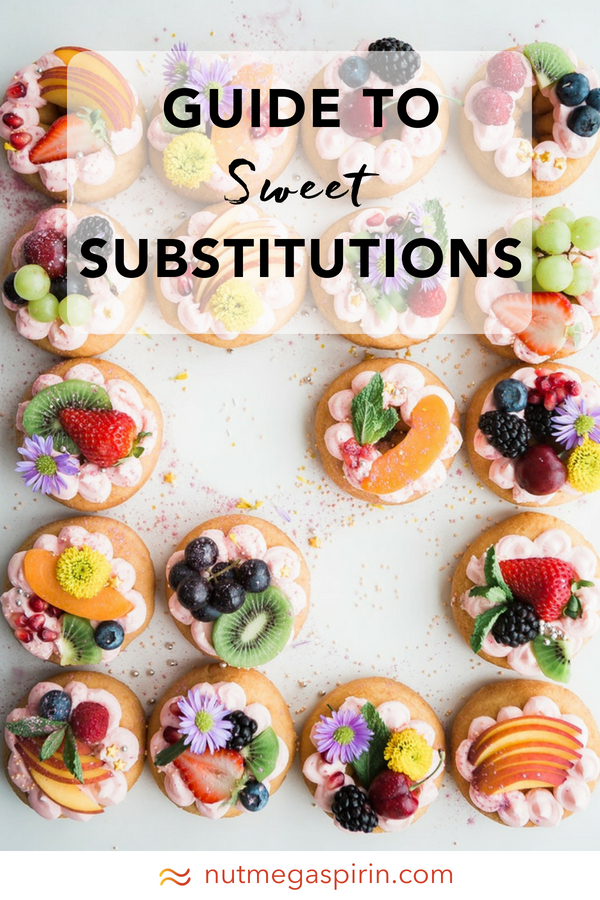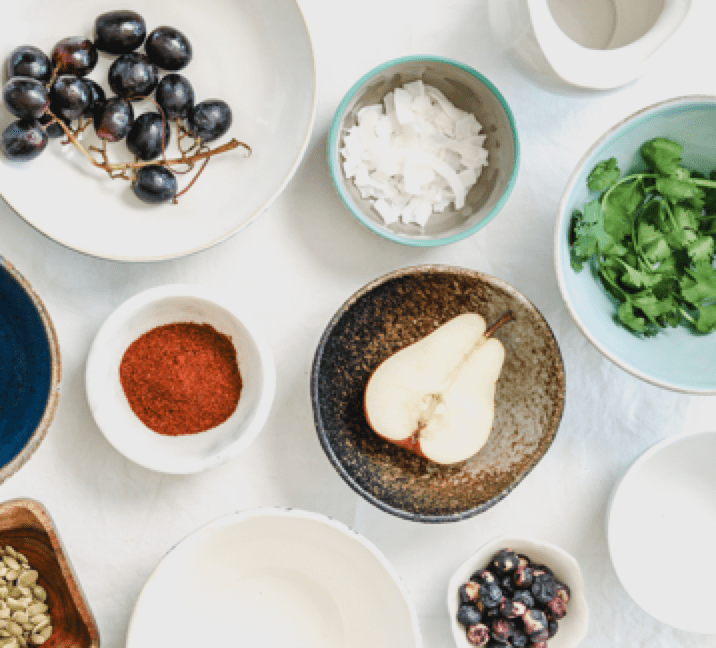Guide to Sweet Substitutions

How It Works
Read the full blog here https://www.holisticole.com/blog/sweet-substitutions
You'd be silly not to agree that a natural an unrefined sweetener is going to be a 'healthier' choice compared to a highly refined, artificial or even a ‘natural’ calorie-free sweetener that provides zero nutritional value.
If there is one super valuable tip that I can give to anyone that is looking to decrease their sugar intake and feel better overall - simplify your routine by focusing on getting in only these sweeteners, in modest amounts:
RAW HONEY
Often in a solid state - raw honey has not been filtered or heated. Packed with enzymes, bee-vitamins, antioxidants, zinc, iron, potassium, calcium and phosphorous along with naturally occurring bee pollen, propolis and royal jelly. Raw honey supports a strong immunity and a healthy gut flora. Unpasteurized honey, which is often in a liquid state (although it may solidify), has likely been filtered, but not heated, and the bee pollen, propolis and royal jelly have been removed - aka a lot of the best raw-honey properties.
It's best not to heat raw honey as this will ensure maximum nutrient potential. You can find raw honey at the farmer markets and directly from local beekeepers (for the best prices). The darker the honey, the richer the flavour and the greater the health benefit.
One tablespoon of honey contains around 16g of natural sugars - with a glycemic index of 50/100
MAPLE SYRUP
Benefits of being Canadian include colourful money and local maple syrup. This natural sweetener is mineral dense in comparison to cane and beet sugar varieties. The simple process of making maple syrup includes; drilling a hole in a sugar maple tree, inserting a 'tap', hanging a bucket to catch the sap, boiling the sap to evaporate out the water, and then filtering of any sediment. A rich source of zinc, manganese, potassium, calcium, iron and magnesium, also containing up to 24 different antioxidants.
In Canada our maple syrup is graded by No. 1, 2 and 3 (Grades are A,B & C in the USA). Grade No.1 (or Grade A) will be the lightest in colour/taste/benefits while Grade No. 3 (or Grade C in the USA) will be the darkest in colour, with the strongest flavour and most benefit!
Maple syrup is heat stable, and can be used in recipes that call for a liquid sweetener/syrup (3/4 cup of maple syrup = 1 cup of sugar). Enjoy in your morning coffee (with some collagen for protein), add it to cookie, cake or loaf recipes, or mix with equal parts hemp oil for a super-powered pancake syrup.
One tablespoon of pure maple syrup contains around 12g of natural sugars - with a glycemic index of 54/100
MAPLE SUGAR
Same benefits of maple syrup but in a convenient granulated form. Maple sugar is made by further boiling down the maple syrup, evaporating even more of the natural water content so that you are left with only the pure maple sugar granules.
Just like maple syrup, maple sugar is heat stable and makes a great addition to recipes that call for a cane sugar. Maple sugar is a cup-for-cup substitution.
One tablespoon of pure maple sugar contains around 8g of natural sugar - with a glycemic index of 54/100
COCONUT NECTAR
Before we have coconut sugar, we have coconut nectar. Coming from the flowering stems of the coconut blooms. This sap is evaporated at low temperatures, producing a low-glycemic and nutrient-rich syrup. A cup-for-cup substitution for a liquid sweetener, coconut nectar is a lower glycemic option for maple syrup.
One tablespoon of coconut nectar contains around 13g of natural sugar - with a glycemic index of 35/100
Find Coconut Nectar on Amazon.
COCONUT SUGAR
This low-glycemic sweetener, also known as coconut palm sugar, looks just like regular brown sugar and is a simple cup-for-cup substitution for granulated sugar in a recipe. Packed with polyphenols, iron, zinc, calcium, potassium, antioxidants, phosphorous and other phytonutrients. Coconut sugar is made from the coconut nectar; made in a similar way as maple sugar - the nectar is heated, and the natural water content evaporates so that you are left with only the pure coconut sugar.
One tablespoon of coconut sugar contains around 3g of natural sugar - with a glycemic index of 35/100
DATES
This super-sweet fruit, normally found in a dried variety is loaded with potassium, copper, iron, manganese, magnesium and vitamin B6. Coming from the date palm tree, there are many varieties of dates however in Canada and the USA we are more familiar with Medjool Dates (larger, softer and sweeter) and Deglet Noor (smaller and tougher).
You can make a date paste to use in recipes: first soak some pitted medjool dates in hot water until soft. Reserve the soaking liquid, and add the soaked pitted dates plus 1-2 tablespoons of the water to a food processor or high speed blender. Blend until creamy and smooth. Add more water as needed to create a thick and rich paste. Store in a mason jar and keep refrigerated, lasts 4-5 days.
One medjool date contains around 16g of natural sugar - with a glycemic index of 42/100
AGAVE
Oh agave. I put this one on here to ensure you are reading this article fully. Although agave is touted as 'natural' sweetener this is not sweetener that I recommend... Instead I advise that people stay away. The process of making agave is not natural in comparison to maple and coconut sugar products. The agave plant (which is also used to make tequila) has fibrous leaves and a natural agave juice/nectar within. During processing, the agave plant is cut and pressed to extract the sugary circulating fluid. This fluid is high in sugar, but it also contains healthy compounds like fructans, which are linked to beneficial effects on metabolism and insulin [2]. However, when processed into a syrup, the manufacturer's break the fructans down into fructose by exposing the sugary fluid to heat and/or enzymes. This process destroys all of the potential health promoting properties of the Agave plant and instead produces a concentrated syrup with fructose levels that are higher than high-fructose corn syrup. A sweetener sold as "Agave nectar" is not truly “nectar” – it is a refined, processed sweetener made from Agave nectar [3].
At the end of the day, remember that sugar is SUGAR. It's going to be processed the same way in your body and you can always have too much of a good thing. Choosing natural is the way to go, but we need to practice moderation. Don't let a sweet tooth get the best of you. Create healthy balance in your lifestyle and when you're feeling up for something sweet; opt-out of classic cane/beet sugar and try one of these sweet substitutions.
It's a LOT more challenging to find products free from cane and beet sugar now (and all the other garbage). If you follow this simple rule you can not only work to decrease your overall sugar intake, but using some of these natural options may provide you with some additional benefits (keeping in mind that drinking a glass of maple syrup isn't a 'great way' to boost mineral intake).
Read the full blog here https://www.holisticole.com/blog/sweet-substitutions
What You’ll Need
Difficulty
nor hard Somewhat
challenging Very
challenging
Story
When you eat or drink something sweet, the amount of glucose in your bloodstream rises. Your friend, the pancreas, is then signaled to secrete the hormone insulin - which works to regulate your blood sugar levels - trying to keep you in a state of balance.
WHERE'S THE PROBLEM WITH THAT?
Well, your body only has two real options on how to deal sugar intake:
#1 - It can burn it for energy (glucose) or it can can store it in the liver and muscles (as glycogen) to be used for energy later
#2 - It can convert the sugar into triglycerides and stored it in fat cells
Depending on your genetic predisposition, you may be someone who metabolizes sugar well, aka use it for energy - or you may be someone who is more likely to store it as fat... Unfortunately the case for most of us, is that we are more likely to store it as fat and there is a much smaller (and luckier) group, that can effectively burn this sugar excess with their fancy fast metabolisms.
Regardless if you're a fast or slow burner - too much sweetness creates a problem. Not to mention it is SO EASY for us to over-consume sugar, because it's in almost everything.
Reminder that sugar feeds our problems, it doesn't relieve them.
Having some berries in your smoothie or on-top of your rolled oats is one thing.
Drinking a 'natural' tea beverage with over 30 grams of added cane sugar, or choosing a 'healthy' chocolate zucchini muffin that still contains 40 grams of added cane sugar is the kind of nonsense we need to watch out for.
BTW. If you see what I did there.
I'm not just picking on the mainstream big evils (aka candy, sweets and pops). You already know the dangers of seriously refined sugar and high-fructose corn syrup.
You can also get foods labelled as 'healthy', 'natural' or 'organic' that are still packed with sugar - these are not necessarily "better".
Then we have those artificial sweeteners: Saccharin (Sweet'N Low), Cyclamates (Sugar Twin), Acesulfame Potassium (Ace-K), Aspartame (Nutrasweet, Equal), and Sucralose (Splenda).
These would not and should not be included in a healthy lifestyle - as many negative side effects have been debated with the use of artificial sweeteners from headaches and migraines to a shrunken thymus gland, impairment of liver and kidney function, and mood disorders.
Not to mention, with the whole calorie-free sweetener thing. Studies are now showing that tasting sweet foods elicits insulin release prior to increasing glucose levels, whether that sweetener contains calories or not (this includes stevia, monk fruit and sugar alcohols) [1].
There are also so many different types of sweeteners now, and probably more than 75 code names - so in my opinion it's actually easier to focus on the one's that are worth including instead of the huge list of ones that are best avoided. With that, let’s meet your Sweet Substitutions:









Awesome post!